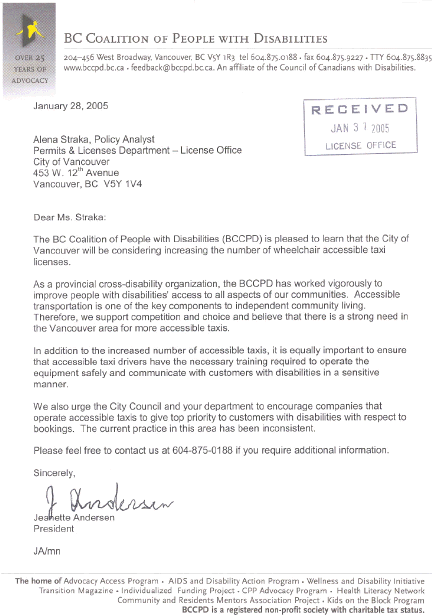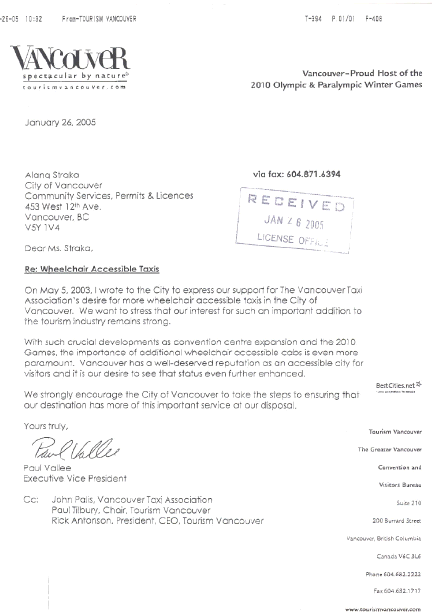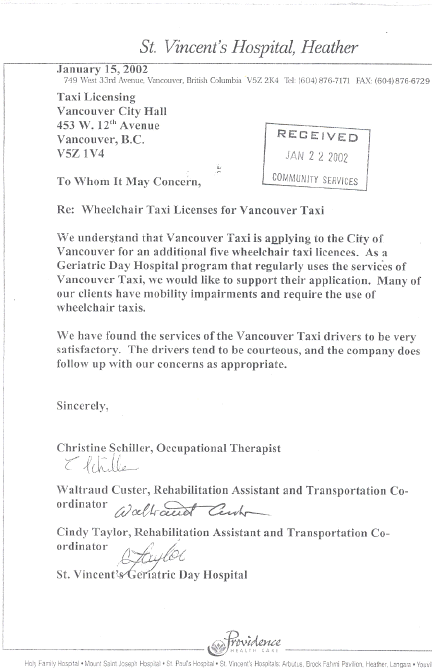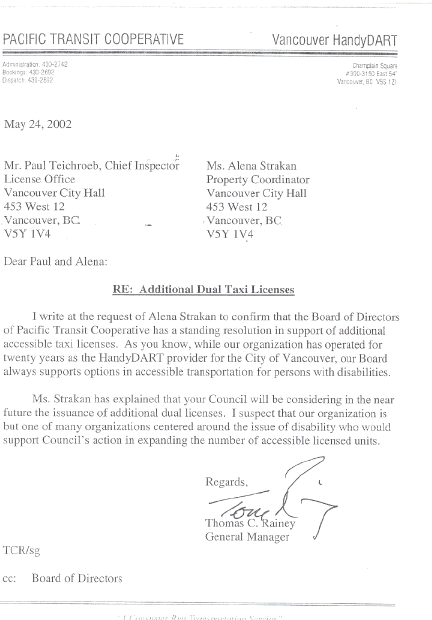|
CITY OF VANCOUVER ADMINISTRATIVE REPORT |
Date: |
January 31, 2005 | |
Author: |
Alena Straka | |
Phone No.: |
(604)871-6683 | |
RTS No.: |
04768 | |
CC File No.: |
2801 | |
Meeting Date: |
March 3, 2005 |
TO: |
Standing Committee on Planning and Environment |
FROM: |
Chief License Inspector |
SUBJECT: |
Additional Dual Taxicab Licenses |
RECOMMENDATION
A. THAT Council approve the issuance of twenty-nine (29) new dual taxicab licenses for an annual license fee of $940.00 each to be distributed amongst the four licensed taxicab companies in the City as per numbers and conditions approved by the former Motor Carrier Commission and outlined in this report.
B. THAT the current $321.00 license fee for taxicabs and dual taxicabs in Schedule A of Vehicles for Hire By-Law No. 6066 be amended to $940.00 so that the 29 additional dual taxicab licenses can be issued at this new fee.
C. THAT Section 20 (1) of Vehicles for Hire By-Law No. 6066 be amended to increase the total number of dual taxicabs in the City in any given year to fifty-nine (59).
D. THAT Council requests staff to amend Vehicles for Hire By-Law No. 6066 to require all taxicab drivers employed by the four licensed taxicab companies in Vancouver to successfully complete at least 45 hours of training approved by the Inspector which includes a focus on transporting people with mobility impairments, by January 1, 2006.
E. THAT the Director of Legal Services be requested to prepare the necessary By-law amendments to Vehicles for Hire By-law No. 6066.
GENERAL MANAGER'S COMMENTS
The General Manager of Community Services RECOMMENDS approval of the aforementioned recommendations.
COUNCIL POLICY
Vehicles for Hire By-Law No. 6066 licenses and regulates owners and drivers of vehicles for hire in the City of Vancouver, including taxicabs and dual taxicabs. Dual taxicabs are defined as a 4 door motor vehicle having a seating capacity of not less than 4 passengers nor more than 7 including one passenger confined to a wheelchair or scooter.
In 1977, Council adopted a policy to make the City more liveable for people with mobility impairments by removing physical and social barriers which impede their full participation in all aspects of City life.
PURPOSE AND SUMMARY
The purpose of this report is to obtain Council’s approval for the issuance of an additional twenty-nine (29) dual taxicab licenses for an annual license fee of $940.00 each. The licenses are to be divided amongst the four licensed taxicab companies in the City of Vancouver, namely Yellow Cab, Black Top Cabs, MacLures Cabs and Vancouver Taxi, as per the numbers approved by the former Motor Carrier Commission and in compliance with the restrictions set by the Commission. Proposed amendments to the Vehicles for Hire By-Law include increasing the maximum number of dual taxicabs to 59. It is also recommended that additional training be made a requirement for all Vancouver taxicab drivers by January 1, 2006.
BACKGROUND
Dual taxicabs differ from regular sedan taxicabs in that they are designed to transport a mobility impaired passenger with a wheelchair or scooter. These vehicles are also attractive to elderly passengers because their high door and ceiling provide easy access. The terms “dual taxicab”, “wheelchair accessible vehicle” and “handicap vehicle” are used interchangeably throughout this report.
Dual taxicabs have been available in Vancouver since the early 1980’s when demand for such vehicles grew in proportion to the City’s increasing population. This demand spurred the City to offer thirty (30) dual taxicab licenses for sale on a bid basis in 1981. In early 1983, all thirty licenses were issued to Vancouver Taxi Ltd. as this was the only proposal that complied with the required conditions. The licenses were issued at a nominal cost of $150 each on the condition that they remained in the name of Vancouver Taxi Ltd. and were not sold or transferred to another person or company.
There have been no new dual taxicab licenses issued in the City of Vancouver since 1983, although there are three (3) additional dual taxicab licenses that have operated in the City under a regular sedan taxicab license on a temporary basis only to meet Airport (YVR) requirements.
Currently there are 418 regular sedan taxicab licenses in Vancouver. The current market value of a dual taxicab license is estimated to be in the range of $250,000, while the current market value of a taxi sedan license can reach a high of $420,000.
On July 11, 1996, Council approved mandatory training (ie. “Taxi Host Level I”) for all taxicab drivers. On October 8, 2002, Council approved the use of minivans as taxicabs allowing taxicab drivers to transport up to five individuals and their luggage. This was intended to alleviate the pressure on dual taxicabs being used to transport able-bodied passengers who require the rear wheelchair compartment of the vehicle for extra luggage space.
DISCUSSION
Elderly and Mobility Impaired Population in Vancouver
In 2004, there were approximately 71,800 individuals 65 yrs+ residing in the City of Vancouver (source: B.C. Statistics).
A lack of up-to-date figures makes it difficult to predict accurate and precise numbers for mobility impaired/disabled persons in the City. However, as part of their applications to the Motor Carrier Commission, the taxi companies retained an economist to estimate the number of mobility impaired people in Vancouver who may require access to wheelchair accessible vehicles and the rate at which demand for such service is likely to grow. The economist concluded that there is a population estimate of approximately 88,000 people in Vancouver with disability and/or agility disabilities that may require access to specialized vehicles. He also testified that with an aging population, the growth in the number of people with severe mobility or agility limitations will considerably exceed the general population growth. No direct correlation between number of persons with disabilities and the need for a specific number of wheelchair accessible vehicles was provided.
Alternate Wheelchair Accessible Transportation Service
Translink operates a publicly subsidized wheelchair accessible transportation service called Handydart, catering to seniors and other mobility impaired persons throughout the Lower Mainland. Although the service is invaluable to many, obstacles to its use include being underfunded, having to book three days in advance and having to share a ride with other passengers. People with priority booking can block book in advance which sometimes leaves little space for others, especially those who do not know exactly when they may require the service. There is also a medical requirement for service eligibility.
Passenger Transportation Board (former Motor Carrier Commission) Jurisdiction
The Provincial Government has jurisdiction on a number of matters related to the taxi industry, most significantly the Passenger Transportation Board (formerly the Motor Carrier Commission) which regulates inter-city buses and passenger-directed vehicles in British Columbia and the Commercial Vehicle Safety and Enforcement Division which regulates the safety and service standards of the taxi industry, including the wheelchair accessible taxi component.
In October 1998, the former Motor Carrier Commission instituted a moratorium on all taxi license applications in the Lower Mainland. In December 1999, the Commission revised the moratorium permitting applications for taxis designed to accommodate persons using mobility aids. On May 20, 2002, the moratorium was lifted entirely and new application policies for taxicab licenses were implemented.
On June 25, 2004, the former Motor Carrier Commission approved applications from the four licensed Vancouver taxi companies seeking permission to operate an additional twenty-nine (29) wheelchair accessible vehicles. At this time, the Motor Carrier Commission heard from many organizations and individuals directly affected by mobility impaired persons and the elderly who require wheelchair accessible vehicles.
Witnesses for the B.C. Coalition of People with Disabilities and B.C. Paraplegic Foundation testified that their services are used by large numbers of people, many of them elderly, with various degrees of mobility and for whom transportation is an important component to a healthy lifestyle. They stated that there is a shortage of wheelchair accessible vehicles in Vancouver and the waits for such vehicles (40 minutes to an hour) usually exceed the wait for a sedan type taxi (10 to 15 minutes). The wait times are also longer during certain peak times of the day, such as early morning and late afternoon.
The Commission also heard from individuals speaking on behalf of each taxi company. A representative of Vancouver Taxi Ltd., which holds the City’s 30 dual taxicab licenses, testified that the company’s main revenue comes from the dual taxicab vehicles. On average, each vehicle brings in between $400-$450 per day. Wait times for dual taxicabs depend on traffic, call load and area of call although 45 minutes was quoted as the average wait time. The majority of complaints are for lengthy wait times. It takes between 2-3 minutes to load and unload a mobility impaired passenger and the meter does not go on until the customer is secured in the vehicle. There are not many night calls for these specialized vehicles.
The number of additional wheelchair accessible taxicabs granted by the former Motor Carrier Commission to each taxi company is shown in the table below:
Taxi Company |
Additional Wheelchair Accessible Cabs approved by former MCC |
Black Top Cabs Ltd. |
8 |
MacLure’s Cabs (1984) Ltd. |
5 |
Vancouver Taxi Ltd. |
6 |
Yellow Cab Company Ltd. |
10 |
TOTAL |
29 |
The Motor Carrier Commission’s approval was conditional upon compliance with the following restrictions:
1. The granted licenses are restricted to the operation of vehicles with a maximum carrying capacity of not more than five (5) passengers, exclusive of the driver.
2. The taxi company is required to operate the permitted number of handicapped equipped vehicles as follows:
a. Provide special loading devices which include ramps and/or mechanical lifts designed to easily and safely load and unload people who are in wheelchairs;
b. Provide wheelchair tie downs and security devices permanently installed in the vehicle so that a person or persons confined to a wheelchair may be transported safely seated in the wheelchair while in the vehicle.
3. The taxi company must at all times maintain in service the permitted number of handicap vehicles. The Motor Carrier plates assigned to these vehicles cannot at any time be used for any other vehicle unless that vehicle is also handicap equipped.
4. Should the taxi company fail to maintain any of the permitted number of handicap vehicles in service, the company will be required to surrender the Motor Carrier plates for those vehicles not in service to the Motor Carrier Branch.
5. All drivers of wheelchair accessible vehicles must have successfully completed “Taxi Host Level II” training.
The Commission also ordered each individual taxi company to implement a priority client service system that tracks the number of calls for and assigns priority to clients requesting wheelchair accessible taxicabs. Data is to be kept on a monthly basis, at minimum, maintained for a minimum of two years and to be made available to the Commission upon request and that security deposits filed with the Commission be retained as payment for
costs. A priority client service system will ensure that the approved vehicles are made available to provide service to customers with disabilities.
Proposed Additional Dual Taxicab Service
The significant increase in Vancouver’s population over the past twenty five years denotes an increase in the City’s elderly and mobility impaired population as well. With the number of dual taxicabs remaining the same during this period, taxi service catering to the City’s mobility impaired and elderly has not kept up with increasing demand. This is substantiated by complaints received by Council and staff confirming that the existing number of dual taxicabs in the City is insufficient to meet demand. Common complaints include the following:
· Customers often have to wait a long time for dual taxicab service.
· Dual taxicab drivers will often choose an able-bodied passenger over an elderly person or one with a mobility aid because of convenience and time.
· With Vancouver Taxi Ltd. being the only dual taxicab provider, customers lack a choice of taxi companies.
Staff have been working with the taxi cab companies to improve service. The companies have been cooperative and responded positively to an upgrade in fleet vehicle conditions and age, additional driver training and a complaint tracking system.
The City has also recognized that additional dual taxicab licenses have been required for quite sometime and this has been supported by the City’s Advisory Committee on Disability Issues. However, the City has been unable to proceed with the issuance of these licenses because of the requirement for Motor Carrier Commission approval. As mentioned earlier in the report, the Motor Carrier Commission held a hearing with all four licensed taxicab companies on June 25, 2004 and subsequently approved the additional 29 licenses. These additional licenses are a first step in responding to the community need. Staff will continue working with the taxi industry in anticipation of future demands for the 2010 Olympics and Para-Olympics.
Proposed Vehicles for Hire By-Law Amendments
The Motor Carrier Commission’s approval of the additional 29 wheelchair accessible licenses has allowed staff to proceed with the process of issuing City licenses. This work has included numerous discussions with the taxi cab companies, a review of current by-laws and fees, researching driver training standards and working with the Motor Vehicle Branch on an acceptable vehicle standard. The result is that staff are recommending the issuance of 29 additional dual cab licenses subject to the by-law changes outlined in this report.
Number and Type of Vehicle
Section 20(1) of the Vehicles for Hire By-law No. 6066 restricts the total number of dual taxicabs owned or operated by persons licensed pursuant to the By-law to forty (40). In addition to the thirty licensed dual taxicabs operating in the City, there are also three dual taxicab licenses temporarily operating by Yellow Cab and Black Top Cabs under a regular sedan taxicab license. Should Council approve the issuance of the 29 additional dual taxicab licenses, these three licenses would be converted back to regular sedan taxicab licenses. The additional 29 dual taxicab licenses plus the 30 existing dual taxicab licenses would restrict the number of dual taxicab licenses city-wide to fifty-nine (59).
The 29 new dual taxicab vehicles will differ from the existing 30 dual taxicabs on the road today. The new vehicles meet provincial standards and are designed to make loading and unloading of elderly and mobility impaired passengers much easier. Members of the City’s Advisory Committee on Disability Issues inspected this new type of vehicle and were impressed with its ease of access and safety options.
Mobility Impaired Passengers
Currently, the Vehicles for Hire By-Law requires owners of dual taxicabs to place an advertisement in the Vancouver Yellow Pages indicating that the vehicle is capable of serving mobility impaired and wheelchair passengers and that requests for service from these persons shall receive priority over all other service requests. In the past, the City has received complaints from some elderly or mobility impaired persons about dual taxicab drivers refusing service at busier times.
As the primary purpose of dual taxicabs in the City is to service the transportation needs of those unable to use regular sedan taxicab vehicles, it is essential that dual taxicab drivers always give priority to mobility impaired customers. Staff will be looking at further bylaw amendments and increased enforcement in order to address this issue if needed.
This issue is also addressed at the Provincial level by the former Motor Carrier Commission’s requirement for taxi companies to implement a priority client service system that tracks the number of calls for, and assigns priority to, clients requesting wheelchair accessible taxicabs.
Taxicab Driver Training
All taxicab drivers employed by the four licensed taxicab companies in the City of Vancouver are required to hold a chauffeur’s permit. Section 5 (3) of Vehicles for By-Law No. 6066 states that the Chief Constable shall refuse to issue a chauffeur’s permit until he/she is satisfied that the applicant has successfully completed a training course for drivers that has been approved by the Inspector and that includes at least 27 hours of training designed to develop and enhance the driver’s knowledge, skills and attitudes. The training course that satisfies this requirement is “Taxi Host Level I” offered by the Justice Institute of B.C.
The Motor Carrier Commission requires that all drivers of the additional 29 dual taxicabs must have successfully completed “Taxi Host Level II” training. This second level of the Taxi Host program focuses on transporting people with disabilities (including loading/unloading), driver safety (assault avoidance and awareness), collision prevention and advanced geography. This additional level of driver training is already a requirement in the City of North Vancouver and for all taxi drivers servicing the Airport (YVR). As this additional level of training is clearly beneficial to the safety of all passengers, it is recommended that the City amend the Vehicles for Hire By-Law No. 6066 to require all taxicab drivers employed by the four licensed taxicab companies in Vancouver to successfully complete a minimum of 45 hours of training approved by the Inspector which includes a focus on transporting passengers with mobility impairments, by January 1, 2006. This will give taxicab drivers enough time to arrange for and complete the required training.
Dual Taxicab/Taxicab License Fees
Currently, the license fee for every person owning or operating either a dual taxicab or taxicab in the City of Vancouver is $321.00. Costs associated with taxicabs include, among other things, license renewals (decals issued), taxi identification cards, vehicle inspections and meter testing twice a year. It is recommended that the current $321.00 license fee for taxicabs and dual taxicabs in Schedule A of Vehicles for Hire By-Law No. 6066 be amended to $940.00 so that the 29 additional dual taxicab licenses can be issued at this new fee. This fee (adjusted for annual inflation) will be charged for all taxi and dual taxicab licenses in 2006. The fee increase is required to recover City costs associated with taxicabs and increased enforcement and monitoring of dual taxicab licenses to ensure that service to the mobility impaired and elderly is being improved.
Support for Additional Dual Taxicab Licenses
The City’s Advisory Committee on Disability Issues to the Mayor and Council fully supports the availability of additional dual taxicab licenses as shown in a Committee meeting excerpt in Appendix A. Additional documentation indicating support for additional dual taxicab licenses in Appendix A is as follows:
1. B.C. Coalition of People with Disabilities
2. Tourism Vancouver
3. Pacific Transit - Vancouver HandyDART
4. St. Vincent’s Hospital
FINANCIAL IMPLICATIONS
The proposed recommendation in this report will increase the City’s licensing revenue by $27,260 (ie. 29 x $940.00) for the Year 2005. As all taxicab and dual taxicab licenses will cost $940.00 (+ annual inflation adjustment) next year, the City’s total licensing revenue for taxicabs in Year 2006 will be approximately $448,380 (ie. 477 total licenses x $940.00).
CONCLUSION
This report proposes that the City issue twenty nine (29) new dual taxicab licenses for an annual license fee of $940.00 each to be distributed amongst the four licensed taxi companies as per the numbers and conditions approved by the former Motor Carrier Commission.
Proposed amendments to the Vehicles for Hire By-Law associated with this request include increasing the maximum annual number of dual taxicabs in the City to 59 licenses. The report also requests Council to instruct staff to amend Vehicles for Hire By-Law No. 6066 to adjust the annual taxicab fee to $940.00 and to require all taxicab drivers employed by the four licensed taxicab companies in Vancouver to successfully complete additional training as outlined in this report by January 1, 2006.
- - - - -
APPENDIX A
EXCERPT FROM ADVISORY COMMITTEE ON DISABILITY ISSUES
June 11, 2002
Amendments to Vehicles for Hire By-law No. 6066:
Additional Licenses for Dual Taxi Cabs
Alena Straka, Policy Analyst, and Paul Teichroeb, Chief License Inspector, reviewed the amendments.
Highlights of Discussion:
C Lower Mainland moratorium for issuing taxi licenses has been lifted;
C report to Council will recommend up to 30 additional dual licenses be issued equitably to various companies;
C mandatory driver training and complaint process is in place;
C mini-van licensing in process.
Suggestions from Committee:
C competition through broader licensing could encourage improved driver performance;
C concern was expressed as to whether increase licensing would improve availability of accessible taxis at Vancouver International Airport;
C 24-hour service should be made available to accessible taxis.
RESOLVED
THAT the Special Advisory Committee on Disability Issues supports the issuing of up to 30 additional dual licenses in the City of Vancouver.
CARRIED UNANIMOUSLY
|
|
|
|
* * * * *




